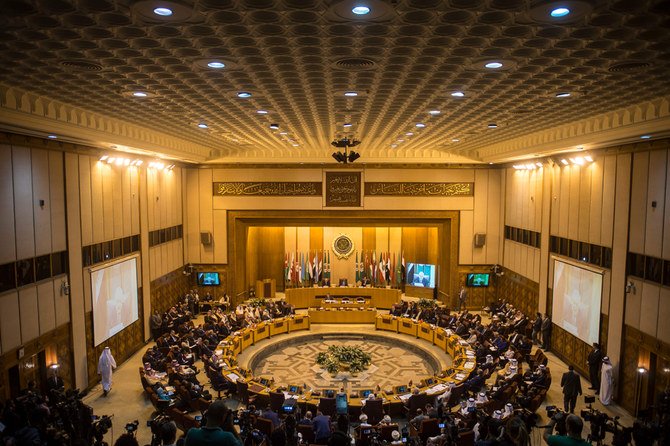
- ARAB NEWS
- 18 Jul 2025

Arab News
JEDDAH: The Arab League has condemned Iran’s continued interference in the internal affairs of Arab countries — both directly and through its proxies — which it said posed a risk to regional security and stability.
It denounced Tehran’s constant aggressive behavior and provocative media activities, pointing in particular to the recent press appearance of a senior official from the Iranian Revolutionary Guard Corps, during which flags and banners of a number of militias as well as armed movements sponsored, financed, and backed by Iran, were displayed.
The organization emphasized the need for Iran’s relations with Arab countries to be based on respecting the principles of international law, including those of good neighborliness, state sovereignty, and refraining from the use of force or threats in any form.
League officials also called for the cessation of provocative acts that aimed to undermine confidence and regional security and stability, especially amid the current global humanitarian crisis caused by the coronavirus disease (COVID-19) outbreak.
Hamdan Al-Shehri, a Riyadh-based international affairs scholar, welcomed the Arab League’s statement, and said: “Iranian aggression in the region needs to be checked. They have created all these militias in the Arab states as instruments of terror and destabilization and these militias are causing havoc.
“The Arab League should take more steps to stop Iran from exporting terror to Arab countries. It is a good sign that 95 percent of the countries, especially the Gulf countries, have taken a united stand against Iranian interference,” he added.
Meanwhile, there were also reactions to international calls for an inquiry into the killing of protesters by Iranian security forces during nationwide demonstrations six months ago over a hike in petrol prices.
Harvard scholar and Iranian affairs expert, Majid Rafizadeh, said: “Once again this shows the regime’s employment of brutal tactics and its disregard for human rights. Whenever the theocratic establishment is under significant pressure domestically, politically, and economically, it resorts to hard power and excessive methods of suppression to control the population and ensure its survival.
“As the regime sensed that the political establishment was in danger due to the protests, it ratcheted up its human rights violations.
“As the regime struggles to curb the protests and growing unrest linked to the disintegrating economy, the world must act to put a stop to the Iranian regime’s human rights abuses.”
Rafizadeh added: “The foundations of the current regime’s power structure, with Supreme Leader (Ayatollah) Ali Khamenei as its head, were built on the 1988 massacre (the state-sponsored execution of political prisoners in Iran).
“The world must know that the authorities now in charge of Iran showed their true allegiance and unwavering fealty to the fundamentalist regime and its goals by having no qualms about ordering and implementing human rights violations and political crimes.”
Meanwhile, the coronavirus has infected more than 10,000 health care workers in hard-hit Iran, news outlets reported Thursday.
Iran on Thursday put the total number of dead from the virus at 7,249, or 66 more than Wednesday.
Health Ministry spokesman Kianoush Jahanpour said there were more than 129,000 confirmed cases of the virus, including 2,392 more than Wednesday.
Iran has the most virus-related casualties in the region.